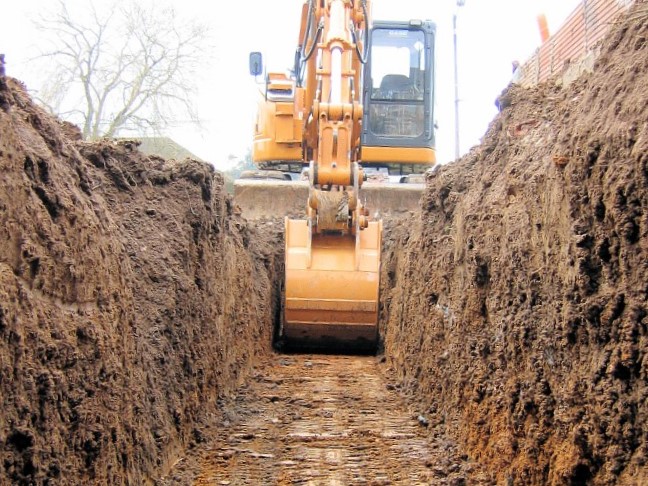Lancaster Excavation - Specialist Excavation Services in Lancaster, OH
Lancaster Excavation - Specialist Excavation Services in Lancaster, OH
Blog Article
Comprehensive Excavation Approaches: Grasping the Fundamentals for Success
The careful planning, precise implementation, and careful attention to detail required in excavation tasks require a detailed strategy that incorporates various basic elements. The real mastery lies not just in comprehending these principles yet in perfectly integrating them to navigate the complexities of excavation projects with skill.
Comprehending Excavation Project Planning

Effective excavation tasks are constructed on the foundation of thorough and meticulous planning. The preliminary stage of any excavation task is the preparation stage, where critical choices are made that can dramatically affect the outcome of the project. During this phase, it is necessary to gather all appropriate information about the site, including topographical studies, dirt make-up, and any type of prospective dangers that might exist. Understanding the project spending plan, scope, and timeline restraints is essential for creating a thorough excavation strategy that makes sure the task's success.
One trick facet of excavation task preparation is the development of an in-depth timeline that outlines the series of tasks, deadlines, and landmarks. This timeline functions as a roadmap for the job team, allowing them to track progression and make essential changes to make certain the project remains on schedule. Additionally, a distinct spending plan that represents all expenditures, consisting of devices rental, labor expenses, and materials, is essential for staying clear of expense overruns and delays. By very carefully considering all these factors during the drawing board, excavation projects can be performed successfully and successfully, causing effective results.
Dirt Evaluation and Website Examination
Performing complete soil analysis and website assessment is a crucial step in the prep work stage of any kind of excavation task. Soil evaluation includes determining the structure, structure, and residential properties of the dirt at the excavation website. This info is important for understanding the soil's bearing ability, moisture content, and capacity for erosion, which are essential factors in identifying the excavation techniques and tools required for the task.
Site examination surpasses dirt analysis and includes a more comprehensive analysis of the total website problems. This examination consists of recognizing any kind of prospective hazards, such as underground utilities, ecological concerns, or unsteady terrain, that might influence the excavation process. By completely assessing the site, task supervisors can create efficient excavation methods that prioritize safety and security, efficiency, and environmental management.
Using advanced modern technologies like ground-penetrating radar, dirt sampling, and drone surveys can improve the accuracy and performance of soil analysis and site analysis. Spending time and sources in these initial steps can ultimately save time and stop expensive delays or issues during the excavation procedure.
Tools Selection and Application
Effective excavation jobs rely heavily on tactical devices selection and usage to guarantee ideal performance and efficiency. Choosing the appropriate tools for the job is essential in maximizing effectiveness and decreasing downtime. Aspects such as the sort of dirt, deepness of excavation, and job extent play a considerable role in figuring out one of the most appropriate devices for the task handy.

In enhancement to picking the appropriate equipment, proper application is vital to task success. Operators needs to be educated to take care of the equipment securely and effectively - lancaster trenching. Normal upkeep checks and timely repair services help protect against malfunctions and make certain constant efficiency throughout the project
Precaution and Regulations Compliance
In the world of excavation jobs, prioritizing safety and security procedures and compliance with laws is paramount to making certain a safe and secure and legitimately audio operational setting. Precaution include a variety of techniques, including carrying out thorough site analyses, carrying out proper signs and obstacles, and giving ample safety training for all personnel associated with the excavation process. Adherence to policies, such as OSHA requirements in the United States, makes certain that the excavation job meets the needed standards to protect workers, bystanders, and the surrounding setting.

Monitoring Development and Adjusting Techniques
How can forecast managers successfully track the improvement of excavation jobs and adapt their techniques appropriately to maximize outcomes? Monitoring progress is crucial for making sure that excavation tasks Web Site stay on track and satisfy due dates.

Verdict
To conclude, understanding the basics of thorough excavation approaches is essential for the success of any task. By comprehending project preparation, evaluating dirt and site conditions, choosing appropriate tools, following safety guidelines, and keeping an eye on progress, job supervisors can make sure a reliable and smooth excavation process. Applying these methods will certainly cause successful results and minimize prospective risks or obstacles during the excavation job.
The initial stage of any excavation job is the preparation stage, where critical decisions are made that can dramatically impact the outcome of the project. Recognizing the project range, timeline, and spending plan restrictions is critical for creating an extensive excavation strategy that makes certain the project's success.
How can forecast supervisors properly track the advancement of excavation tasks and adapt their strategies as necessary to maximize results? By closely keeping track of progression and being ready to adapt strategies, project supervisors can enhance the total success of excavation tasks.
By comprehending project preparation, evaluating soil and site conditions, choosing proper devices, conforming with safety and security laws, and monitoring development, task supervisors can make sure a efficient and smooth excavation process.
Report this page